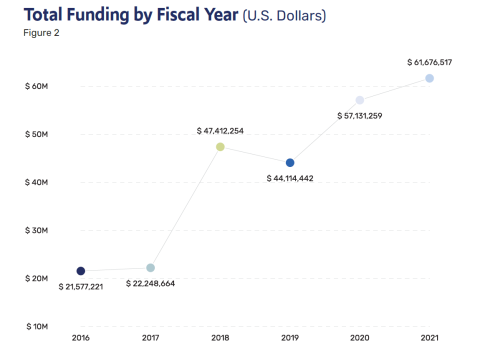What Is a Treatment Court?
Treatment court programs are specialized court docket programs that allow individuals to enter long-term drug treatment and agree to court supervision rather than receive a jail sentence.
Treatment court participants who complete the program can have their underlying criminal offenses dismissed or expunged. However, if a participant fails to complete the program, their case is processed through the traditional justice system.
Types of Treatment Courts
The first treatment court opened in 1989 in Miami, Florida, to address how often individuals would cycle in and out of prison due to drug addiction.
Today, there are more than 4,000 drug treatment courts nationwide, according to the National Treatment Court Resource Center (NTCRC). Adult treatment courts are the most prevalent treatment court, making up about half of all treatment courts in the United States.
Since 1989, treatment court programs have expanded from serving only adults to include the following:
- Juvenile drug treatment courts
- DUI/DWI courts
- Family treatment courts
- Mental health courts
- Veterans treatment courts
- Tribal healing to wellness courts
In 1995, the first juvenile drug treatment court opened in Visalia, California.
Juvenile drug treatment courts are designed for youth with substance use disorders who come into contact with the juvenile justice system. About 9 percent of all U.S. treatment courts are specifically designed to support youth.
Although they vary in target populations and resources, a multidisciplinary team usually manages treatment court programs. This team may include judges, prosecutors, defense attorneys, community corrections officers, social workers, and treatment service professionals.
Benefits of Treatment Courts
The primary goal of treatment courts is not punishment. Instead, treatment courts recognize addiction as a disease and aim to treat the chronic disease affecting behavior and impulse control.
Research from the National Institute of Justice (NIJ) found that treatment courts reduce participant recidivism and drug use. According to NIJ's Multisite Adult Drug Court Evaluation, treatment court participants were less likely than a comparison group (40 percent vs. 53 percent) to report committing crimes in the year before being interviewed for the study.
Treatment court participants were also significantly less likely than the comparison group (56 percent vs. 76 percent) to report using any drugs in the prior year.
How OJP Supports Treatment Courts
Supported by the Bureau of Justice Assistance (BJA), the NDCRC provides a variety of resources to support treatment court professionals who design and implement programs that align with best practice standards. The NDCRC features original publications, interactive maps, a calendar of training opportunities, and more.
Through the Adult Treatment Court Program, BJA provides financial and technical assistance to implement or enhance the operations of treatment courts. Additionally, BJA's Veterans Treatment Court Program provides veterans' treatment courts and criminal justice professionals with the resources necessary to reduce recidivism and increase veterans' access to critical treatment and recovery support services.
The Juvenile Drug Treatment Court Guidelines from the Office of Juvenile Justice and Delinquency Prevention provide juvenile courts with key objectives to emphasize family engagement and address the substance use and mental health disorders experienced by youth.
Funding for Treatment Court Programs
Treatment courts rely on local, state, and federal funding to operate their programs.
Since fiscal year (FY) 2016, BJA funding to support treatment court programs has more than doubled.
In FY 2021, BJA awarded $61.6 million to support treatment court programs across the United States.
Between FY 2016 and FY 2021, BJA awarded over $254 million across 507 grant awards to implement new treatment court programs, expand or enhance existing programs, and support statewide efforts to expand treatment court services.
Current funding opportunities from the Office of Justice Programs that support treatment courts can be found on the OJP Current Funding Opportunities page.
More on Treatment Courts from OJP
Visit the following pages for additional information and resources produced or sponsored by the Office of Justice Programs and other federal agencies:
| Treatment Grants and Funding | Treatment Courts Publications |
| Treament Courts Training & Technical Assistance | Treatment Courts Additional Resources |



